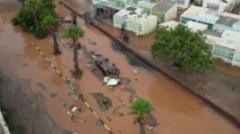Is Cape Verde's State of Emergency Enough to Tackle Deadly Floods?

Cape Verde's State of Emergency: Understanding the Impact of Recent Floods
Cape Verde, an archipelago located off the west coast of Africa, has recently declared a state of emergency in response to catastrophic floods that devastated the islands of São Vicente and Santo Antão. The floods, which resulted in the tragic loss of at least nine lives and displaced around 1,500 residents, were triggered by Tropical Storm Erin, bringing unprecedented rainfall to the region. This article delves into the events surrounding the floods, the government’s response, and the ongoing relief efforts to support the affected communities.
The Causes of the Catastrophic Flooding
The flash floods that struck Cape Verde were primarily caused by Tropical Storm Erin, which unleashed a staggering 193mm (7.6 inches) of rain within a mere five hours. This amount of rainfall far exceeds São Vicente's annual average, highlighting the severity of the situation. Deputy Prime Minister Olavo Correia described the floods as "catastrophic," emphasizing the urgent need for immediate response and recovery efforts.
According to meteorological experts, the heavy rains were unprecedented. Ester Brito from Cape Verde's meteorology institute stated that the recorded precipitation was "above our 30-year climatologist average," indicating an unusual weather pattern. Furthermore, it was revealed that the country lacked the radar equipment necessary to accurately forecast such extreme weather events, which could have potentially mitigated some of the damage caused by the floods.
Impact on Infrastructure and Communities
The aftermath of the flooding has left a trail of destruction. Roads, homes, and vehicles have sustained severe damage, complicating rescue and recovery operations. Local authorities are working tirelessly to locate missing individuals, while the urgency of restoring essential infrastructure remains a top priority.
Interior Minister Paulo Rocha described the night of the floods as "marked by panic and despair." Eyewitness accounts from those in São Vicente paint a harrowing picture of the chaos. Alveno Yali, a community organizer, described the event as an "incredible moment of heavy rains, strong winds, and flash floods," which resulted in significant material losses for the residents.
Government Response and Emergency Measures
In light of the disaster, the Cape Verdean government has enacted a state of emergency, which activates crisis funds aimed at facilitating urgent infrastructure repairs. This declaration allows for the mobilization of resources necessary for immediate relief efforts, including humanitarian aid and repairs to damaged infrastructure.
The state of emergency signifies the government's commitment to addressing the needs of affected communities. By allocating resources to repair roads and restore essential services, authorities aim to ensure that residents can return to their normal lives as quickly as possible while also preparing for any potential future weather-related disasters.
Community and Diaspora Support
The Cape Verdean diaspora, particularly those residing in France, Luxembourg, Portugal, and the United States, has stepped up to provide critical support. Urgent crowdfunding campaigns have been launched to raise funds for essential supplies, including food, water, hygiene products, and other emergency necessities.
As of now, tens of thousands of euros have already been raised, demonstrating the solidarity and generosity of the Cape Verdean community abroad. Andreia Levy, president of Hello Cabo Verde in France, stated that the entire diaspora is mobilized, with plans to deliver aid directly to those in need.
The Future of Cape Verde: Preparing for Climate Challenges
The recent floods in Cape Verde serve as a stark reminder of the increasing vulnerability of island nations to climate change and extreme weather events. As the impacts of global warming continue to manifest, it is crucial for the government and communities to adapt and prepare for future challenges.
Investing in advanced meteorological equipment and early warning systems will be essential to better predict and respond to extreme weather conditions. Additionally, strengthening infrastructure to withstand severe weather events can help mitigate the impact of future disasters.
Conclusion: A Call to Action
The devastating floods in Cape Verde underscore the need for immediate response and long-term planning in the face of climate challenges. While the government and local communities work diligently to recover, the support from the diaspora showcases the strength of global connections in times of crisis. As we reflect on the resilience of the Cape Verdean people, it is vital to consider how we can better prepare for the uncertainties of our changing climate.
FAQs about Cape Verde's Flooding and Response
What caused the flooding in Cape Verde?
The flooding was primarily caused by Tropical Storm Erin, which resulted in an unprecedented amount of rainfall in a short period, leading to flash floods on the islands of São Vicente and Santo Antão.
What is the current state of emergency in Cape Verde?
The state of emergency allows for the mobilization of crisis funds and resources to address the immediate needs of affected communities, including infrastructure repairs and humanitarian aid.
How can people help those affected by the flooding?
People can contribute to crowdfunding campaigns set up by the Cape Verdean diaspora to provide essential supplies such as food, water, and hygiene products to those impacted by the floods.
What are the long-term implications of the flooding for Cape Verde?
The flooding highlights the need for improved infrastructure, advanced meteorological capabilities, and better preparedness for climate change-related events to reduce vulnerability in the future.
As Cape Verde begins its recovery process, the resilience and support from both local and global communities emphasize the importance of unity in the face of adversity. What measures do you think should be prioritized to better prepare for future climate challenges? #CapeVerde #ClimateChange #DisasterRelief
Published: 2025-08-13 15:00:42 | Category: world



